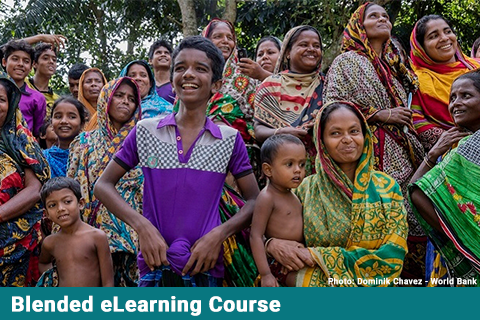 This eLearning course is designed to foster government innovation, specifically targeting social inclusion of people in vulnerable situations. It emphasizes introducing effective approaches, strategies, and real-world experiences at the national, local, and regional levels. Key focus areas include multistakeholder engagement, innovative public service delivery, and ICT and digital government for people in vulnerable situations by actively involving them in policy creation, execution, and evaluation. By positioning these individuals as agents of change, the Blended eLearning course seeks to cultivate a more inclusive and participatory governance framework, ultimately striving for tangible improvements in the lives of those facing socioeconomic challenges.
This eLearning course is designed to foster government innovation, specifically targeting social inclusion of people in vulnerable situations. It emphasizes introducing effective approaches, strategies, and real-world experiences at the national, local, and regional levels. Key focus areas include multistakeholder engagement, innovative public service delivery, and ICT and digital government for people in vulnerable situations by actively involving them in policy creation, execution, and evaluation. By positioning these individuals as agents of change, the Blended eLearning course seeks to cultivate a more inclusive and participatory governance framework, ultimately striving for tangible improvements in the lives of those facing socioeconomic challenges.
This Course comprises of 6 Units:
• Unit 1: Government Innovation for Social Inclusion of People in Vulnerable Situations
• Unit 2: What is Vulnerability? Root Causes, Policy, and Legislative Frameworks
• Unit 3: Addressing Root Causes of Vulnerability: Actions, Perspectives, and Governance
• Unit 4: Innovating Public Services and Enabling Ecosystems for Social Inclusion
• Unit 5: Capacity Development: Enabling Engagement and Enhancing Social Inclusion
• Unit 6: Implementing Government Innovation, Tracking, and Monitoring Its Impact
Author(s): UN DESA, DPIDG, UNPOG
Learning objective(s):
Upon the successful completion of the eLearning course, learners will:
• Gain an understanding of their needs and of why promoting government innovation is key to effectively addressing dynamic, evolving and context-de pendent vulnerabilities and demands of people in vulnerable situations.
• Assess and analyze the progress, status and challenges of a country/organization in fostering government innovation for social inclusion of people in vulnerable situations through self-assessment, knowledge-sharing, and discussions.
• Identify and apply various innovative approaches, strategies, and practices for promoting government innovation for social inclusion based on the specific context and needs of each country/organization, particularly for:
1) Integrating the "leaving no one behind"principle into national development and planning strategies.
2) Promoting inclusive and participatory governance through engagement of people in vulnerable situations in decision-making processes, transforming public services delivery systems through co-designing and co-creating services, and building partnerships.
3) Leveraging digital technologies and digital government as effective means and platforms to deliver inclusive services and better engage people in vulnerable situations, while ensuring digital inclusion.
4) Prioritizing budget allocation for financing for social inclusion.
• Enhance understanding and gain tools to ensure that people in vulnerable situations can be the agents of change through engagement, empowerment and promoting an inclusive mindset for promoting social inclusion.
SDG(s): SDG 10 (Reduce inequality within and among countries), SDG 16 (Promote peaceful and inclusive societies for sustainable development, provide access to justice for all and build effective, accountable and inclusive institutions at all levels)
Estimated Effort:
Level: Beginner
Language(s): English
Certificate: Yes
Price: Free
For more information please reach out to the UNPOG team